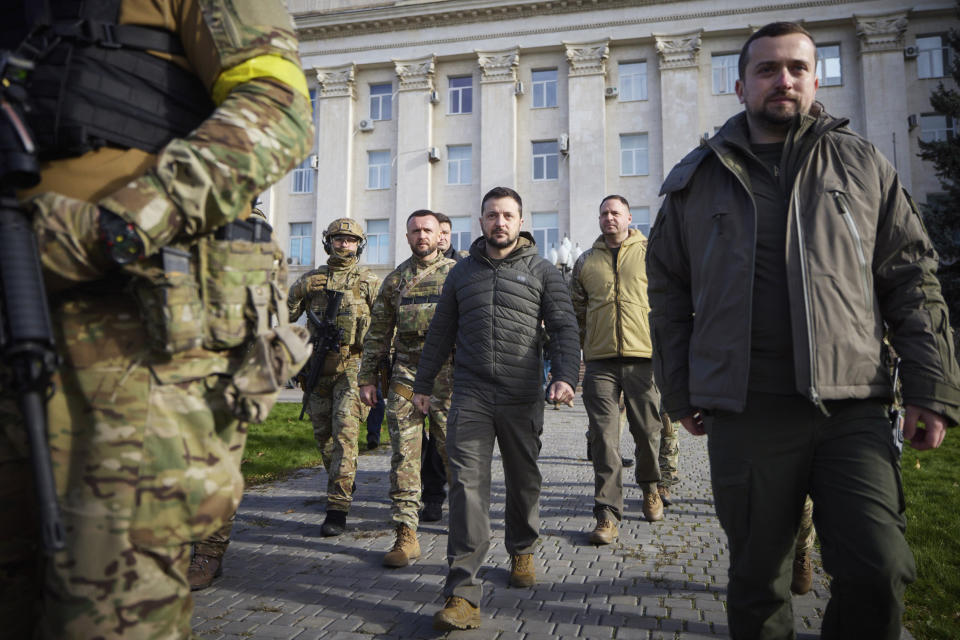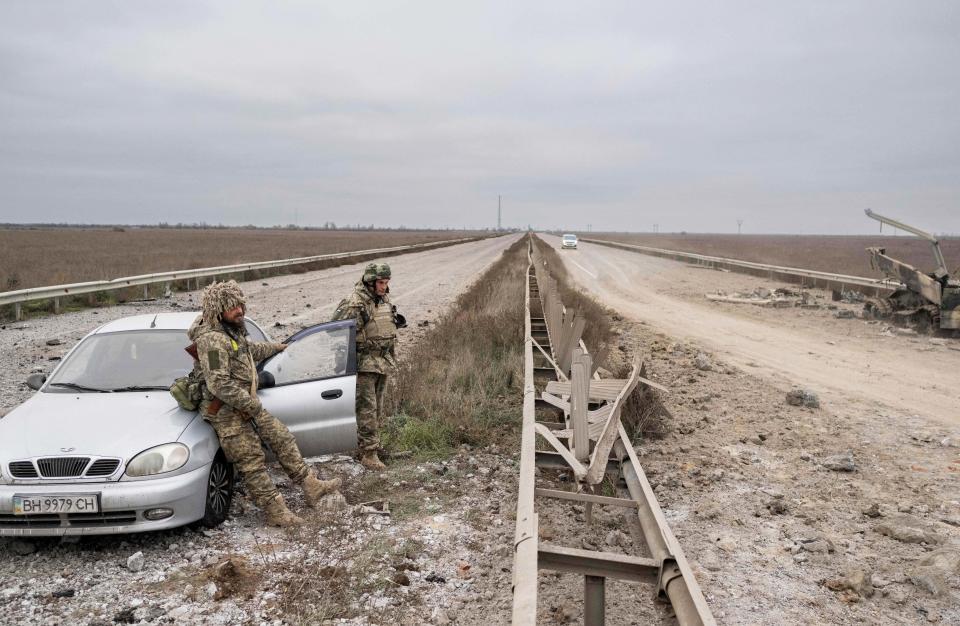Zelenskyy visits liberated Kherson as Ukraine celebrates Russian retreat
- Oops!Something went wrong.Please try again later.
- Oops!Something went wrong.Please try again later.
KHERSON, Ukraine — The city has no power or water, a brutal war rages just a few miles away and allegations are surfacing of Russian war crimes. But the triumph of liberation was still fresh in the Kherson air Monday, when Ukrainian President Volodymyr Zelenskyy visited the crucial regional capital.
Zelenskyy was in Kherson on an unannounced visit to greet jubilant residents and take selfies with soldiers — the blue and yellow flag again flying from official buildings and in the hands of cheering civilians.
“The moment is very important,” Zelenskyy, surrounded by ever-watchful soldiers, told NBC News. “That was the biggest city that was occupied since Feb. 24. So that was the biggest city and now it’s free.”
Despite the euphoria on display, the war’s almost unimaginably high stakes were illustrated by a meeting on Monday between the head of the CIA and his Kremlin counterpart to discuss the risk of Russia using nuclear weapons in Ukraine.
Kherson, a southern port city of huge strategic and symbolic importance, was retaken by Kyiv's troops just days ago after the latest humiliating Russian retreat. The toll of nearly nine months of occupation may be felt for years to come — but for now at least, there is celebration.
“This is the beginning of the end of the war,” Zelenskyy told reporters. “We are step by step coming to all the temporarily occupied territories.”

The high emotions of the city were summed up in a 9-second video that was shared widely across social media this weekend.
A Ukrainian soldier, Oleh, was one of the first to enter Kherson and went straight to his grandmother’s house. His grandma, Lidya Malahoval, can be seen collapsing to the floor and weeping.
Like so many, Malahoval was without power and had not seen the footage of their reunion — the emotions came flooding back to her later when NBC News found her and showed her the video.
“I was so, so happy to see him, my grandson, that he’s running to me, that he’s alive.” she said. She watches the moment again and again on a smartphone, kissing the screen when her grandson appears.
Oleksiy Hodzenko, a spokesman for the Ukrainian Ministry of Defense, was receiving hugs and thanks from repeated well-wishers in Kherson on Monday.
“The flags, they must have been hiding them for months, some of them underground,” he said. “Now people are happy as they understand that life is coming back. Where there is Moscow there is no life, only death.”
Steve Andre, from Detroit, Michigan, said he joined the Ukrainian army as a volunteer two months ago. On Monday he was shaking hands and signing autographs — in English — in Kherson.
“It’s incredible, you kind of feel like a rock star,” he said.
“We’re incredibly happy but we’re bittersweet about it — this is a liberated city but we’ve paid for it with our blood and that’s important for us to remember.”
In an overnight address prior to his visit, however, Zelenskyy stressed that the true picture of the ongoing Russian threat to the area and the brutality of the occupation was just beginning to be understood.
Ukrainian prosecutors have evidence of more than 400 separate Russian war crimes, he said.
"Bodies of dead civilians and servicemen have been found,” he said. "The Russian army left behind the same savagery it did in other regions of the country it entered."
Ukrainian officials and international allies say mass graves in Irpin, Bucha and Hostomel are just some examples of Russian war crimes. Russia denies deliberately targeting civilians during the war and NBC News has not verified the claims.
Meanwhile, a spokesperson with the White House’s National Security Council confirmed earlier reports that CIA Director William Burns was in Ankara, Turkey, for talks with his intelligence counterpart.
"We have been very open about the fact that we have channels to communicate with Russia on managing risk, especially nuclear risk and risks to strategic stability," the spokesperson said. "He is conveying a message on the consequences of the use of nuclear weapons by Russia, and the risks of escalation to strategic stability."
Throughout October, Russian state television hosts and some officials, including former President Dmitry Medvedev, openly called for the use of nuclear weapons to defend four recently claimed regions of Ukraine like Kherson, Donetsk, Luhansk and Zaporizhzhia.
Earlier this month after weeks of apocalyptic atomic innuendo, Russia reaffirmed its long-standing policies on the use of nuclear weapons — a possible sign that the Kremlin is trying to cool the escalatory rhetoric it used throughout October.

Ukraine's immediate concern is to supply the city with water, power, food and medicine, all of which are in short supply. The ongoing conflict nearby — Russia still controls about 70% of the broader region — could make this task a real challenge.
Ukraine’s armed forces made clear that the war is far from over, detailing how Russian forces were rearming and regrouping on the eastern bank of the Dnieper river, which runs to the south of the city, while carrying out offensive operations in the eastern Donetsk region.
Officials also warned of the danger of mines left behind by Russian troops.
The Russian retreat was widely seen as an embarrassing reversal for President Vladimir Putin, who weeks earlier had proclaimed the annexation of Kherson and declared it would be part of Russia forever.
Kherson was the only regional capital captured during his nine-month-old “special military operation” and both the city and its broader region hold geographic and military importance.
Kremlin spokesman Dmitry Peskov on Monday refused to comment on Zelenskyy’s visit to Kherson, saying only that “you know that it is the territory of the Russian Federation.”
Those gathered in Kherson to greet and thank Ukrainian soldiers would not agree.
Marc Smith reported from Kherson, Patrick Smith reported from London and Dan De Luce reported from Washington.
This article was originally published on NBCNews.com

